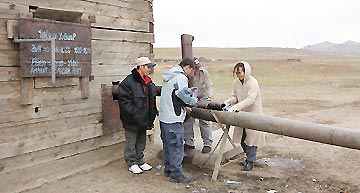Church greeter has firm grip on thousands of names
Posted: 11/30/07
Church greeter has firm
grip on thousands of names
By Dee Anne Finken
Religion News Service
ANCOUVER, Wash. (RNS)—Some people preach. Others bear witness to their faith with a song of praise.
Rich Liedtke ministers with his hands. That is, he offers a firm, two-handed grip that lasts long enough for him to look straight into a churchgoer’s eyes, memorize the face, and announce cheerfully: “Hi, I’m Rich. And you are?”
| Rich Liedtke greets Kelli Wright at the Church of God in Vancouver, Wash. Liedtke has memorized the names of more than 3,000 people who come through the church doors; Wright was the 3,000th. (RNS photo/Beth Nakamura/The Oregonian) |
The 64-year-old is a “master greeter”—his own term—who proclaims his faith by welcoming newcomers and members to church every Sunday, each by name. Over the years he has memorized thousands of names and faces, though he stopped keeping a tally at his own church three years ago at 3,000.
“People want to be known as individuals, and a person’s name is the key to that,” Liedtke said.
His passion for making visitors and members feel welcome frequently has him traveling across the country, and even to Asia, to lead seminars.
A handyman by trade, he shows congregations how to “enhance a culture of friendliness,” from memorizing names, to using the proper grip, to fostering the sincerity that makes a person feel at home in a new church.
His message is more significant than many might think.
A Gallup Poll reported church attendance across the nation declined about 4 percent last year. So extending a sincere welcome to a newcomer can be crucial, said Jerry Hickson, chairman of the department of religion and Christian ministries at Warner Pacific, a liberal arts Christian college in Portland.
“People who visit a church decide within the first five minutes if they are going to come back,” Hickson said.
Ministerial leaders might not realize it, Hickson said, but “there is no question many churches do a poor job of greeting.”
At Vancouver First Church of God, which Liedtke has attended for 30 years, Carol Ludwig said Liedtke’s remembering her name—on her second visit—prompted her to take lessons from him.
Standing next to her mentor on a recent Sunday, Ludwig said: “When someone remembers you, you want to come back. My gosh, it made me think, ‘I must be pretty special.’”
One after another, Liedtke greets worshippers as they pour through the church door—Judy, Tom, Dave, Kelli, Ally and Natalie.
It was Kelli Wright, new to the church three years ago, whose name was the 3,000th Liedtke memorized. The next Sunday, he greeted her with a helium-filled balloon to celebrate the milestone. And he has been known to mark other special occasions, like handing out chocolates near Valentine’s Day.
“I felt welcome and important that he cared enough to know my name,” Wright said.
With newcomers, Liedtke pauses to hold their hands a moment longer while making a mental note. Sometimes, on a folded 3-by-5 card, he’ll jot down a name, followed by a description—beard, tall, flowered shirt, blond.
Liedtke, who has been married 40 years to the appropriately named Joy, is admittedly outgoing, but he understands some people just don’t want to open up.
It’s rare, however, he said. In the eight years he’s been formally greeting, Liedtke can count only six people who have declined to reveal their names.
Most are like he was, he said, when years ago two older gentlemen welcomed him into church and opened him to the practice of extending a hand to others.
“I liked that. I felt welcome.”
News of religion, faith, missions, Bible study and Christian ministry among Baptist churches, in Texas, the BGCT, the nation and around the world.




